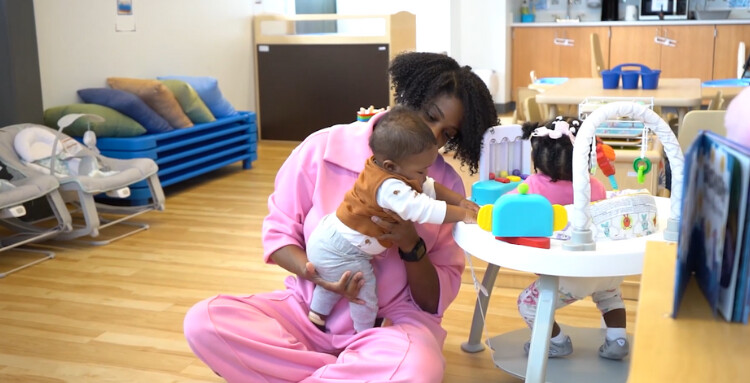When New Britain resident Johnika Webster arrives at her daycare each morning, she’s not the only one who enters the building.
Webster walks down a hallway, past three more doors, with three other women running their own babysitting businesses.
Her business, Kinder Care, is part of the YWCA of New Britain’s child care business incubator.
“At 6:30 a.m., I can see this community coming to fruition,” said program coordinator Nicole Villanueva.
“When they come here, we all meet in the hallway or in the lobby, discussing our concerns and our strategies and all that kind of stuff. »
The new business model that supports New Britain’s working families and entrepreneurs is the result of years of advocacy and collaboration.
Housing, affordability
“We’ve always had a shortage of infant and toddler care in New Britain, and we just haven’t been able to address it and solve the problem,” said Tracey Madden-Hennessey, YWCA CEO.
Housing and access to capital have been the biggest obstacles for people wanting to open child care centers.
If the YWCA could provide the space needed for child care centers, Madden-Hennessey and her team thought it could solve some problems.
Housing and access to capital have been the biggest obstacles for people wanting to open child care centers.
But as of 2018, the Connecticut license did not allow this model.
That changed in 2021, when lawmakers passed a bill for a pilot program allowing seven communities to open child care business incubator centers to train, educate and certify future educators, who could then staff existing centers and open new facilities.
In 2024, lawmakers expanded the scope of the bill to allow licensing of child care business incubation centers in 20 additional cities throughout the state.
The YWCA opened its first child care business incubator in the fall.
Program model
Over a period of five months, the YWCA organized training for 10 women for approximately eight hours per week.
“We developed a curriculum that covered business and financial literacy issues, early childhood and licensing aspects,” Villanueva said.
The Women’s Business Development Council helped organize financial literacy classes to teach entrepreneurs how to run a business.
“I always wanted to open a daycare and I didn’t really know where to go. »
Johnika Webster of Kinder Care
“I always wanted to open a daycare and wasn’t really sure which direction to take,” Webster said.
“What many of us have found really beneficial is the financial aspect, because we no longer receive a direct salary. From now on, our commercial success depends on our ability to succeed.
The YWCA interviewed the women who took the courses, offering four of them the opportunity to open their businesses in the New Britain Housing Authority’s Center of Excellence building.
“Owning a daycare, everything is left up to you to determine the curriculum, the funding, and the incubation program has just provided an opportunity, a path,” Webster said.
Independent businesses
Madden-Hennessey said the incubator is central to the YWCA’s mission to empower New Britain’s women and families with economic empowerment and opportunity.
The Center of Excellence classrooms are fully equipped as independent childcare businesses with their own LLC.
“They all operate independently with the goal that in three years they will be able to transform into a community space that will be their own and operate independently outside of that space so we can start all over again,” Madden – Hennessey said.
The Center of Excellence classrooms are fully equipped as independent childcare businesses with their own LLC.
During the first year, the YWCA pays rent for the space.
With profit margins so low in the first year, Madden-Hennessey said she wanted to give women a chance to get back on their feet.
After the first year, incubator officials will review annual income and a percentage of the gross annual income will be donated to the YWCA.
Half of this will go into a mandatory savings account to help business owners build up the capital they need to become self-employed when they are ready.
Partnerships
The establishment and operation of the program stem from the success of numerous collaborations.
The YWCA leveraged its resources and relationships with the City of New Britain for funding and with its housing authority to secure the space, the Women’s Business Development Council for education support and grants, and several other private donors.
“Whether it’s a very large geographic area or a small town, you can do it. It just requires partnerships, and I think business is a critical partner in that as well,” Madden-Hennessey said.
“It just requires partnerships, and I think business is a critical partner in that as well. »
Tracey Madden-Hennessey of the YWCA
Thanks to the partnerships and the success of the program so far, more than a dozen children are receiving services and the women who operate the businesses are able to work on their long-term projects.
“Actually, I want to open a center, that’s my goal. And I want to open some of them,” Webster said.
“The incubator program gave us the foundation to get started, and they will continue to support us. So I feel like it’s doable.


